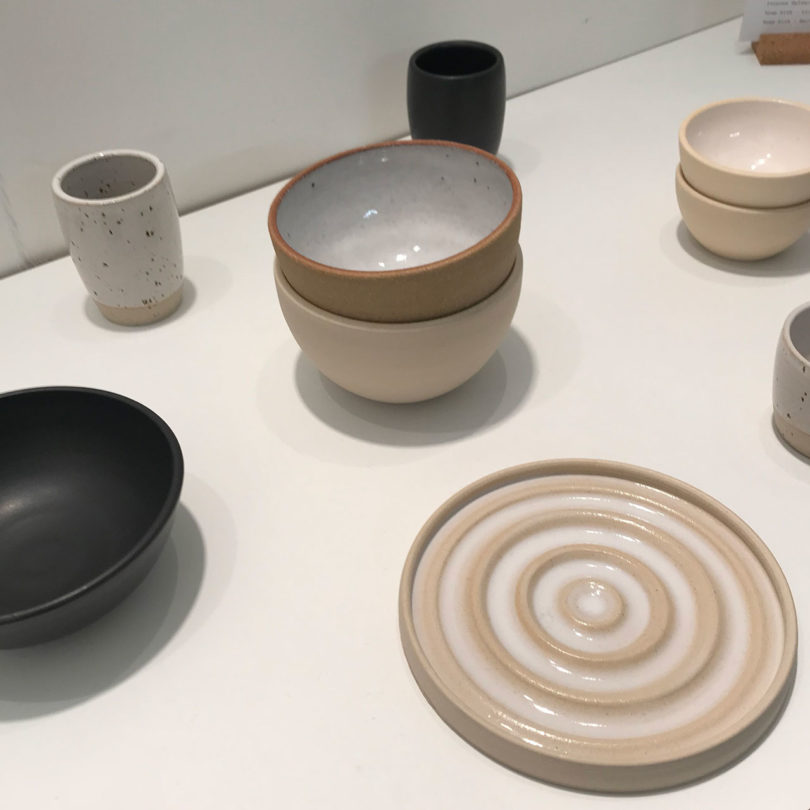The phrase ‘hole and corner’ means ‘a secret place or a life lived away from the mainstream’ and seemed a fitting description for the British craftsmen and women that were the focus of the independent magazine by the same name when it was established five years ago. However, the phrase can also mean ‘insignificant’ – and today nothing could be further from the truth, as evidenced by the British Craft Pavilion curated by the magazine’s editors for the London Design Fair (formerly known as Tent).
Based in St Ives in Cornwall, Dor & Tan create quiet homewares made from local clay using sustainable production methods. “The story of Dor and Tan began with a desire to break away from the disposability of modern life, to create objects with a more personal connection,” they explain. “We want our items to become cherished memories, that favorite cup you always pick when boiling the kettle, the soup bowl you reach for after being caught in the rain.”
With a similar ethos at the other end of the country in Sheffield, Pottery West comprises Catherine and Matt West, ceramicists and designers with an ambition to make pieces “that are directly useful to people” and a practice that spans production pottery, design and research.
But the Granddaddy of them all is the Leach Pottery – established in 1920 by father of British studio pottery Bernard Leach, and still carrying on his tradition to this day with a studio full of contemporary makers. These pieces are by current lead potter Roelof Uys.
Bernard Leach promoted the idea of “standard” that would ensure quality pottery across the UK and even dedicating a chapter in ‘A Potter’s Book’ to the idea entitled “Towards a standard”. Today Leach Pottery Standard Ware is a team effort across the studio’s potters and this set of three mixing bowls is the perfect example.
With a more art-based approach, Naomi Bikis is behind Bikis Ceramics and the British Craft Pavilion marked the launch of her ‘Soft, Soft Hard 2018’ collection, each of which is made by hand in her East London studio, blurring the boundaries between sculptural and functional forms.
Moving on to textiles, Jo Elbourne is a designer and maker based in Margate on the Kent coast, exploring the “seemingly simple act of manipulating string and cord in one direction against another”. Her practice encompasses artwork, furniture and paper goods.
Lucy Rainbow (her real name) is an RCA graduate and London-based printed textile designer, who says she was drawn to screen printing because it democratized printed fabrics, citing the William Morris sofa her parents had when she was growing up.
Her handcrafted pieces, inspired by domestic ephemera and nature, create a “comfy modernist” aesthetic through her use of color, pattern and sustainable practices.
Maria Sigma is an award-winning London-based textile artist specializing in “zero waste” ethical hand-woven textiles inspired by her native Greece and the color palette of the British landscape. “By using exceptional natural materials, I create textiles and furniture pieces for projects large and small, commercial and residential, combining expertise in made-to-measure throws, cushions, rugs, and furnishing fabrics,” she says.
The final part of the British Craft Pavilion was the unveiling of the inaugural Cræftiga winners. Cræftiga was founded by Hole & Corner to unearth the next generation of undiscovered craftspeople. One of the winners was Charlotte Kidger, whose Industrial Craft project explores the use of post-industrial polyurethane foam dust created by CNC machines, using cold casting techniques.
from Design MilkArt – Design Milk https://ift.tt/2yboX2D











No comments:
Post a Comment